Did you know that ultra-processed foods account for about 60% of the calories in the American diet? This is a huge number that shows how much processed foods affect our health. These foods often have unhealthy ingredients like salt, sugar, and artificial colors. Knowing what processed foods are and how they affect our health is key to making better food choices.
Recent studies show that Americans get almost 70% of their salt from processed and restaurant foods. Also, 90% of the added sugar in our diets comes from these foods. These numbers are scary and show we need to pay attention to what we eat. By picking healthier processed foods and reading labels, we can avoid foods with too much fat, salt, and sugar.
Exploring processed foods reveals their potential health risks. Eating them can increase the risk of obesity and diabetes. There’s also a link between sugary drinks and heart disease. Our food choices greatly affect our health. By focusing on whole foods and being careful with processed foods, we can control our nutrition and make better health choices.
Key Takeaways
- Ultra-processed foods make up about 60% of the calories in the American diet
- Americans get close to 70% of the salt they eat from processed food and restaurant food
- 90% of added sugar in Americans’ diets comes from highly processed foods
- Choosing healthier processed foods and reading food labels can help avoid items high in saturated fats, sodium, and added sugars
- Prioritizing whole foods and being mindful of processed food intake can help mitigate potential health risks
- Understanding nutrition facts and ingredients is crucial for making informed choices about our nutrition and food safety
Understanding Processed Foods
Processed foods are common in our diets because they are easy and affordable. But, they often have preservatives, additives, and artificial flavors that harm our health. They also tend to be high in sodium, which can raise blood pressure and lead to heart disease.
What Are Processed Foods?
Processed foods include frozen, canned, and packaged items. These foods often have trans fats, which can increase cholesterol and heart disease risk.
Common Types of Processed Foods
Some common processed foods are:
- Frozen meals
- Canned goods
- Packaged snacks
- Baked goods
These foods are often full of unhealthy ingredients and lack essential nutrients.
How Processing Affects Nutritional Value
Processing can greatly reduce the nutritional value of foods. Many processed foods lose their natural nutrients and fiber. They also gain added sugars, sodium, and unhealthy fats, which are bad for our health.
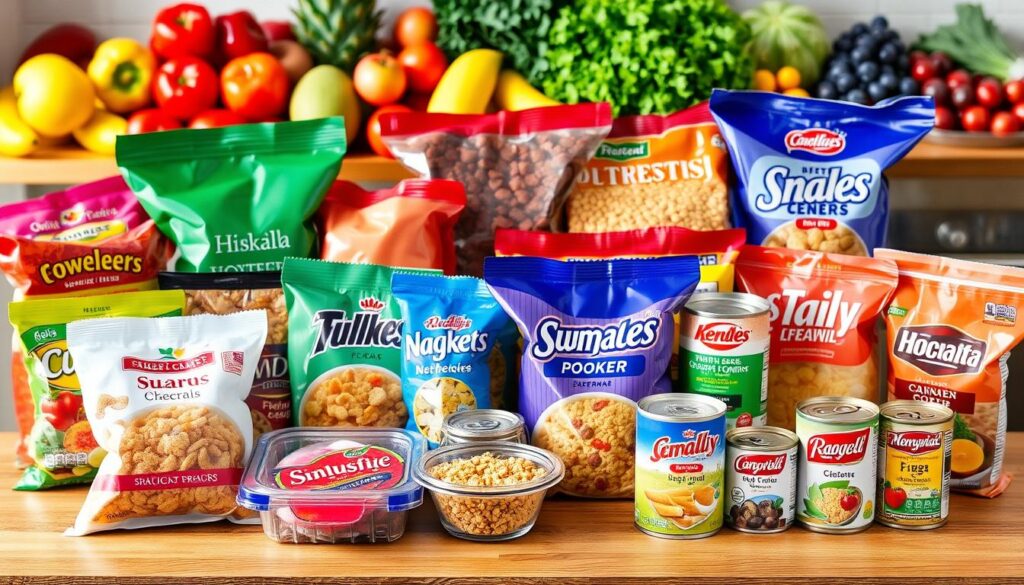
Knowing what processed foods are and their impact on health helps us make better choices. Eating whole, unprocessed foods like fruits, vegetables, and lean proteins can boost our health and lower disease risk.
| Food Type | Processing Method | Nutritional Value |
|---|---|---|
| Frozen Meals | Freezing | Low in nutrients, high in sodium |
| Canned Goods | Canning | Low in fiber, high in sugar |
| Packaged Snacks | Packaging | High in unhealthy fats, low in essential nutrients |
The Role of Additives in Processed Foods
Processed foods often have additives to make them taste better, feel different, and look appealing. These can include sugar, salt, and artificial colors. These additives might not be good for our health. It’s important to check food labels to know what’s in our food.
Whole foods like fruits and veggies are naturally low in additives and full of nutrients. Choosing organic can also lower our exposure to harmful additives. But, even organic products can have additives, so always read labels.
Some common additives and their effects include:
- Artificial colorings, which may be linked to hyperactivity in children and cancer
- Preservatives, which can help maintain food quality but may have negative health effects in excess
- Non-sugar sweeteners, which can contribute to weight loss but may have questionable long-term benefits

By making smart choices about what we eat, we can avoid harmful additives. Choosing whole foods and carefully reading labels helps us make better choices. This can lower our risk of chronic diseases.
The Impact of Processed Foods on Weight
Processed foods can greatly affect weight management. They are often high in calories but low in nutrients. Eating too many of these foods can lead to weight gain. Studies show that a diet rich in processed foods can add about 500 extra calories daily compared to eating unprocessed foods.
How Processed Foods Contribute to Weight Gain
Ultra-processed foods are made to last long and taste good. This makes it easy to eat too much and gain weight. They also contain unhealthy fats like refined oils, which can harm digestion and metabolism.
When thinking about processed foods and weight, consider these points:
- Caloric density: Processed foods have lots of calories but few nutrients.
- Nutritional value: Ultra-processed foods lack essential nutrients compared to whole foods.
- Digestive health: Eating too much processed food can cause digestive problems and harm health.
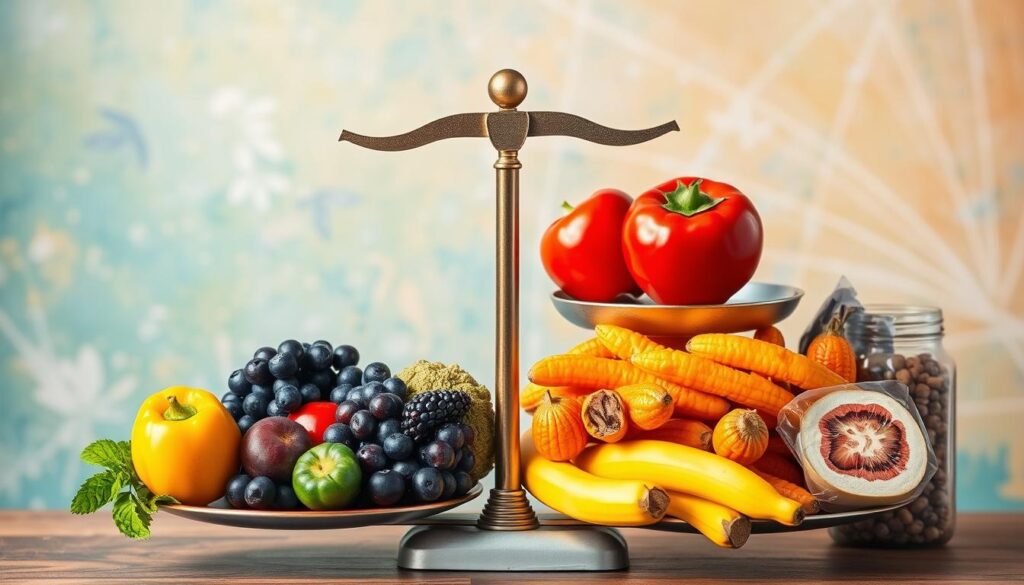
To keep a healthy weight, focus on controlling calories and eating whole foods. Making smart choices and being aware of processed foods’ effects can improve digestion and metabolism. This leads to a healthier lifestyle.
Processed Foods and Chronic Diseases
Eating too much processed food can lead to chronic diseases like heart disease, diabetes, and metabolic syndrome. This is because these foods are full of salt, sugar, and unhealthy fats. These can harm your immune health. It’s important to know the food myths and dangers of processed foods.
Studies show that eating lots of ultra-processed foods can raise your risk of heart disease and stroke. But, eating whole foods and cutting down on processed foods can lower this risk. The World Health Organization (WHO) suggests eating less sugar, aiming for less than 10% of your daily calories.
Some key facts about processed foods and chronic diseases are:
- 7.5 million deaths each year are linked to high blood pressure, caused by too much salt.
- Eating too many ultra-processed foods can lead to chronic diseases, bad brain health, and early death.
- Processed meats and sugary drinks are bad for your health. It’s best to eat less or avoid them.
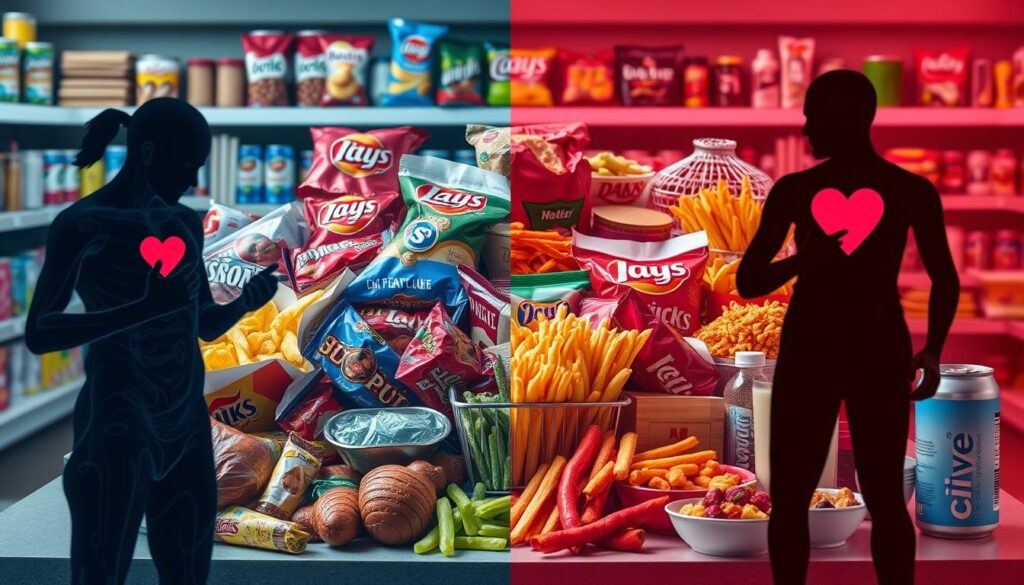
By choosing wisely and eating healthily, you can lower your risk of chronic diseases. It’s key to know the risks of processed food dangers and eat less of them. This helps keep your diet balanced.
| Disease | Link to Processed Foods |
|---|---|
| Cardiovascular Disease | High levels of salt, sugar, and unhealthy fats |
| Diabetes | High sugar content and low fiber |
| Metabolic Syndrome | High levels of unhealthy fats and low essential nutrients |
Healthy Eating: What Does It Mean?
Healthy eating means eating a variety of whole foods like fruits, vegetables, whole grains, and lean proteins. This way, you get all the nutrients your body needs. It also helps you avoid hidden sugars and unhealthy ingredients in industrial foods.
It’s not just about avoiding bad foods. It’s about making smart choices. For example, picking whole foods over processed ones boosts your fiber and cuts down on added sugars. Knowing how food is made can also guide your healthy eating decisions.
Defining Healthy Eating Patterns
Healthy eating patterns mean getting a balanced mix of nutrients. This includes fruits, vegetables, whole grains, and lean proteins. It helps your body get what it needs to work well. It’s also key to limit industrial foods and hidden sugars for a healthy diet.
Importance of Whole Foods
Whole foods are key to a healthy diet. They give you fiber, essential nutrients, and help you avoid unhealthy ingredients. Unlike industrial foods, whole foods are less processed. They have fewer hidden sugars and additives. Eating whole foods helps keep your diet balanced and lowers disease risks.
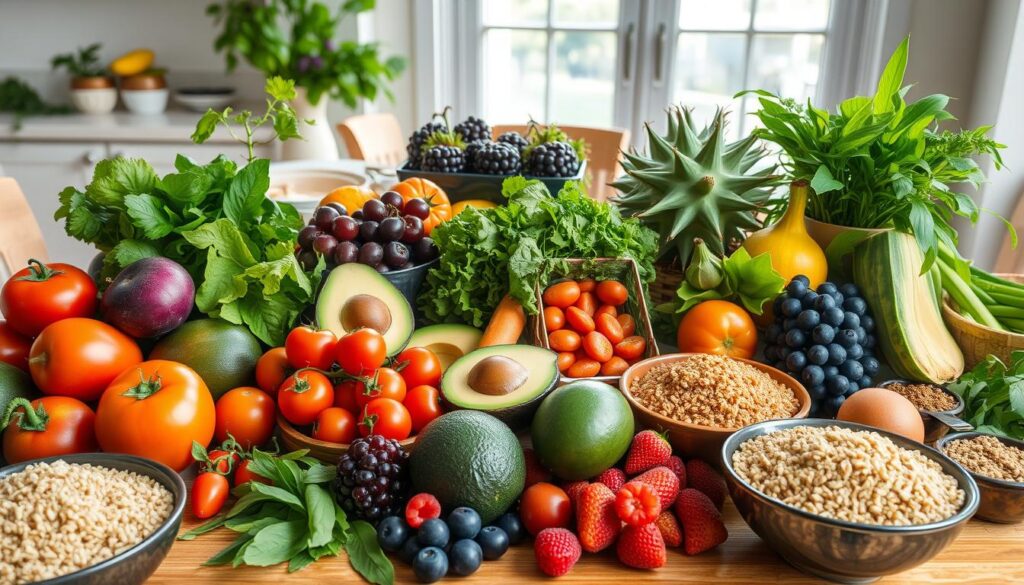
Adding whole foods to your diet is easy. Start by adding more fruits and veggies to your meals. Choose whole grains over refined ones. And cut down on processed and industrial foods. These simple changes can make a big difference in your health.
Ways to Identify Healthy Processed Foods
To keep a balanced diet, knowing how to pick healthy processed foods is key. With so many choices, it’s hard to make good ones. But, by controlling portions and reading labels, you can make better choices.
A good processed food has fewer ingredients and less added stuff. It’s also important to look at the fitness nutrition details like calories, fats, salt, and sugars. The American Heart Association says to keep sodium under 2,300 mg daily, about one teaspoon of salt.
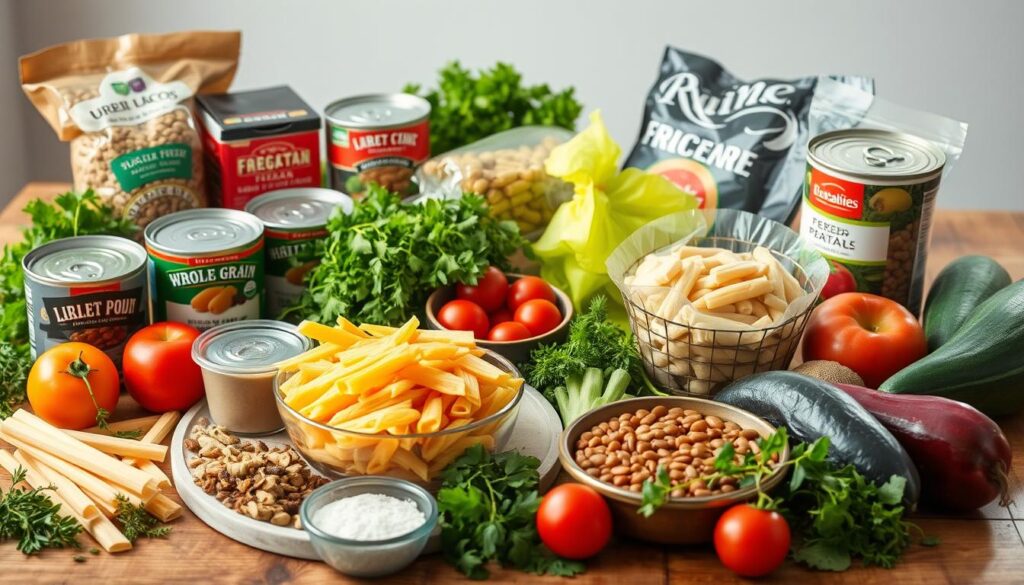
Choose foods with fewer ingredients and less processing. Healthy options include frozen broccoli, canned tuna, and low-sodium soups. Adding these to your diet helps keep your heart healthy and your meals nutritious.
For a balanced diet, mix whole foods with some processed ones. Remember to control your portions. This way, you can stay healthy and reach your fitness nutrition goals.
Balancing Processed Foods in Your Diet
Moderation is key when balancing processed foods in your diet. By practicing moderation and planning healthy meals, you can cut down on unhealthy processed foods. The food industry has many healthy snacks and low-sodium options for your meal prep.
Start by making small changes to your daily food choices. Swapping refined grains for whole grains can protect against heart disease and diabetes. Drinking water instead of sugary beverages can also help reduce processed food intake and improve your diet.
Tips for Moderation
- Replace highly processed foods with whole or minimally processed foods
- Incorporate healthy snacks into your meal prep, such as fruits and vegetables
- Choose low-sodium options when available
Meal planning and preparation are crucial for balancing processed foods. Planning your meals in advance helps you make healthier choices and avoid processed foods. Focus on making sustainable changes that you can keep up with for a healthier lifestyle.
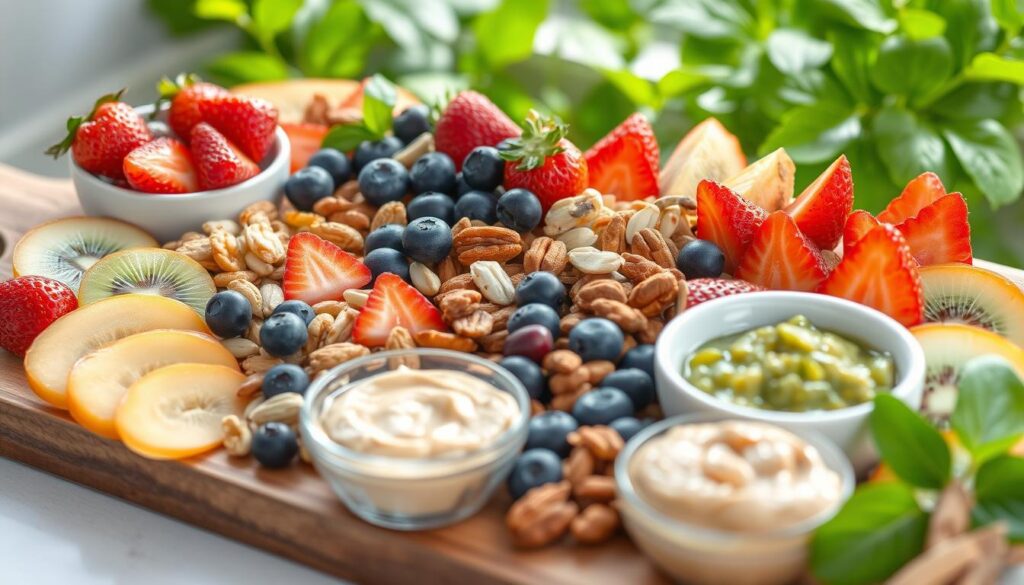
Meal Planning and Preparation
Adding healthy snacks and low-sodium options to your meal prep can improve your diet. Remember, small changes can make a big difference over time. Making smart food choices can greatly impact your health.
| Food Type | Health Benefits |
|---|---|
| Whole Grains | Protect against heart disease, diabetes, and certain types of cancer |
| Fruits and Vegetables | Reduce the risk of high blood pressure, heart disease, and stroke |
| Low-Sodium Options | Help reduce blood pressure and the risk of heart disease |
The Benefits of Whole Foods
Choosing whole foods is key to a healthier life. It helps cut down on food additives and encourages mindful eating. This way of eating boosts digestion, helps with weight, and lowers disease risks.
Whole foods have many benefits, including:
- More nutrients than processed foods
- Full of natural fiber, minerals, and vitamins
- Good for the gut, boosting the immune system and mental health
For grocery tips, picking sustainable choices is vital. Buy whole foods from local markets to cut down on processed items. This helps the planet and supports local businesses.
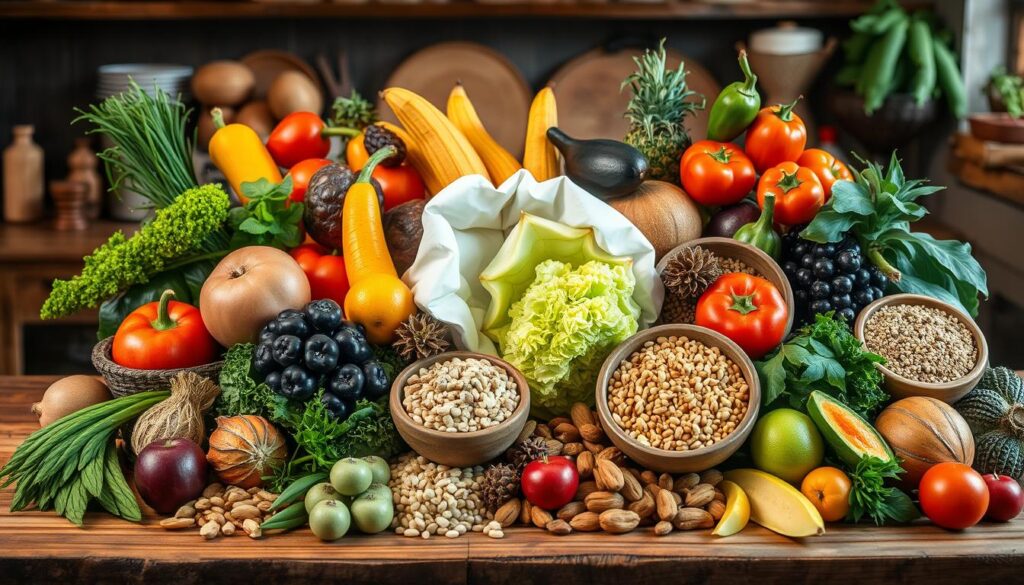
Eating whole foods daily can lower heart disease, cancer, and diabetes risks. They also reduce inflammation, which is good for the heart and lessens pain. By choosing whole foods, you’re in charge of your health.
| Food Type | Nutritional Value | Health Benefits |
|---|---|---|
| Whole Foods | High in fiber, minerals, and vitamins | Supports healthy digestion, weight management, and reduces chronic disease risk |
| Processed Foods | Low in essential nutrients, high in additives | Contributes to weight gain, increased risk of chronic diseases, and digestive issues |
Making Informed Choices
To stay healthy, we need to make smart food choices. This means being consistent with our diet and making lifestyle changes. One key step is tracking calories and trying out healthy recipes.
When shopping for groceries, keep these tips in mind:
- Read nutrition labels carefully to make informed decisions about the foods you buy.
- Choose whole foods over processed ones whenever possible.
- Plan your meals in advance to avoid last-minute, unhealthy choices.
Tips for Smart Grocery Shopping
It’s also crucial to think about the foods we buy and how they fit into our diet. Simple changes like cooking at home more and avoiding sugary drinks can greatly improve our health.

Navigating Fast Food Menus
Even when eating out, we can choose healthier options. Look for restaurants with healthy recipes and watch portion sizes to avoid overeating. By controlling our food choices and being consistent, we can stay healthy and lower our risk of chronic diseases.
The Future of Processed Foods
The food industry is changing, moving towards healthier options. This change comes from people wanting better food choices. They want to know more about food diversity and how it helps reach health goals.
Food science is key in making tasty, healthy processed foods. It helps manufacturers create products that are good for you.
Healthy processing trends include using natural ingredients and less sodium and sugar. More plant-based proteins are also being used. These changes meet what consumers want and are expected to keep growing.
With food education, people can make better food choices. This helps them reach their health goals. Food science plays a big role in this.
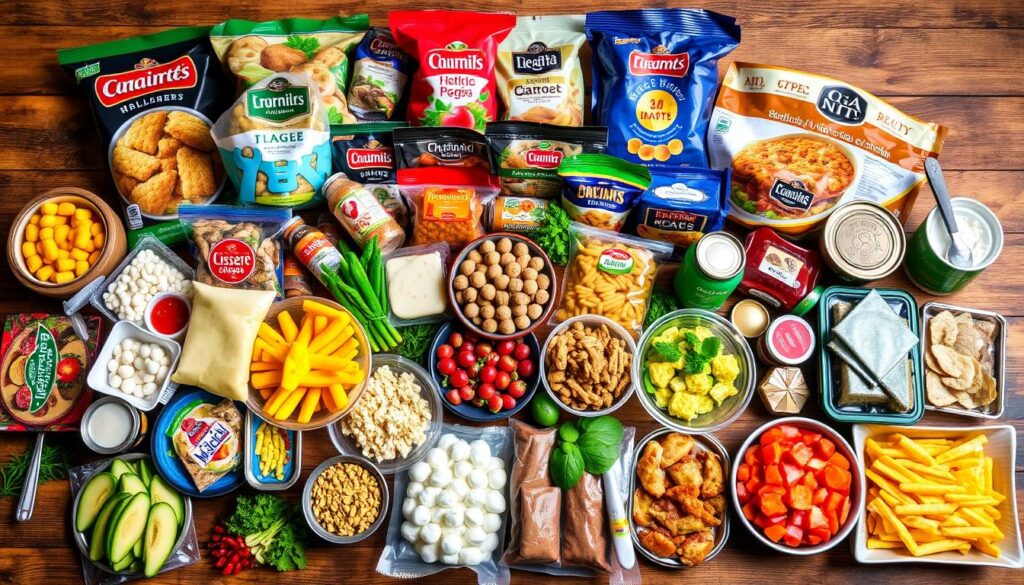
Studies show that most of our food comes from processed or ultra-processed foods. But, more people are looking for healthier options. Food education and diversity help consumers make better choices.
As research shows the link between diet and health, food science’s role will grow. It will shape the future of processed foods.
Addressing Misconceptions About Processed Foods
Many people think all processed foods are bad for weight loss and healthy eating. But, not all processed foods are unhealthy. With the right practical advice and dietary awareness, you can choose better.
Healthy eating starts with meal planning. Planning meals helps you avoid bad foods and get the nutrients you need. Even some processed foods, like canned fruits and veggies, can be good for you.

Want to eat healthier? Know what a healthy meal looks like. It should have fruits, veggies, whole grains, and lean proteins. With these tips and practical advice from trusted sources, you can lose weight and stay healthy.
Conclusion: Your Health and Your Choices
The food we choose greatly affects our health and happiness. While processed foods are easy and familiar, it’s key to think about our nutrition. By learning about healthy eating, dietary fiber, and food production, we can make better choices for our health.
The growth of industrial foods brings challenges like added preservatives and too much sugar and salt. But, by reading labels and choosing whole foods, we can find our way. Small changes can make a big difference in how we feel.
Keep moving forward on your path to better health. Take control of what you eat. With some knowledge and the will to make smart choices, you can create a diet that boosts your energy and health. For example, Eggoz Eggs are a great source of nutrients for a healthy diet.





















